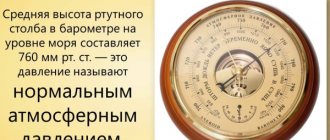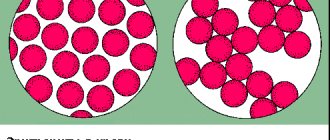Weather sensitivity is the body's sensitivity to changes in weather conditions. Today this relationship has been scientifically confirmed, but just a few decades ago not everyone took the existence of weather dependence seriously. By the way, weather sensitivity is not just drowsiness or headaches in rainy weather - everything is much more serious. It has been proven that, against the background of certain weather conditions, some people may experience exacerbations of chronic diseases, asthma attacks, heart attacks or strokes. Why does this happen, what weather is most dangerous for weather-sensitive people, and is it possible to somehow break your “connection” with the weather? Modern science has already found answers to these questions.
Is weather sensitivity a disease of modern people?
Someone might think that the dependence of one’s well-being on weather conditions is the lot of modern people and that bad ecology or frequent stress is to blame. In fact, the reasons are different. Let's say more, even in ancient times, people noticed that changes in the weather affected their well-being.
Content:
- Is weather sensitivity a disease of modern people?
- Why do we react to the weather?
- Meteopathy and meteosensitivity: how to recognize
- Weather sensitivity index: how to determine
- Meteopathological syndromes
- Weather sensitivity in adults and children: who is at risk
- Weather factors affecting well-being
- Why is weather sensitivity dangerous?
- Treatment of weather dependence
Hippocrates mentioned weather dependence in his writings approximately 400 BC. The ancient Germans noticed that in damp, cold weather joint pain became more frequent and they called this condition nothing more than weather pain. And Tibetan doctors even believed that any illness was, to one degree or another, related to weather conditions. In later times, researchers assumed that even a change in wind direction could affect a person’s well-being, and constant alternations of warm and cold atmospheric fronts were called the main cause of illness.
Why do we react to the weather?
The human body is designed in such a way that it is able to resonate to any changes in weather conditions. Any weather changes do not go unnoticed by our body. The reason for this relationship is usually called our nerve receptors, which, like antennas, detect weather changes. As a result, the entire body adapts to certain signals from nerve cells, and in this case, organs and systems temporarily switch to functioning in a state of stress, that is, “increased combat readiness.” The outcome of such events is easy to predict: the most weakened systems begin to malfunction. In some people the cardiac system reacts, in others the nervous system reacts, and still others complain of digestive problems.
But here’s the question: why do some react extremely painfully to changes in weather, while others don’t even notice weather vagaries. The whole reason is the body’s ability to adapt and adapt to natural phenomena. If the adaptation mechanisms in the body work properly, then the person does not react in any way to changes in the weather outside the window. Otherwise, we have to talk about weather dependence or weather sensitivity.
Meteopathy and meteosensitivity: how to recognize
If, against the backdrop of a change in weather, the general condition of the body changes, then they say that a person has meteopathy (meteo - a celestial phenomenon, pathos - suffering, illness). But meteosensitivity, or meteodependence, is a person’s increased sensitivity to changing weather conditions. Researchers suggest that approximately 35-40% of the world's population suffers from weather sensitivity. Most of them are elderly people: approximately 8 out of 10 elderly men and women complain that their well-being is dependent on the weather.
Weather dependence can manifest itself in a variety of symptoms. In many ways, the manifestation of the disorder depends on the age and general health of the person. In young people with relatively good health, a change in weather can be accompanied by ailments of varying degrees; in elderly people and those suffering from chronic illnesses, their health worsens at such times and old ailments remind themselves. People who are weather-sensitive usually complain of increased fatigue, loss of physical strength, decreased mental activity, and inability to collect their thoughts.
A sharp change in weather also affects the quality of sleep: while some are hampered by insomnia, others, on the contrary, fall asleep on the go. In addition, the weather also affects the mood of weather-sensitive individuals. It can make us hot-tempered, irritable, and overly restless.
One of the most common symptoms of weather dependence is a headache that appears when weather conditions change. It is often difficult to determine the nature of such pain and at first it seems causeless. The same can be said for abdominal pain. Weather-dependent people may experience spasms in the digestive organs without visible signs of poisoning. Also, against the background of weather conditions, blood pressure and body temperature may change (for some, it rises to 37.3).
Atmospheric exposure
The atmospheric phenomenon that has developed now is called an anticyclone. It is an area of high pressure characterized by good calm weather without any unexpected temperature changes. It would seem, live and be happy. But no, it is precisely this condition that has a very detrimental effect on a person’s health. Anticyclones are especially poorly tolerated by those who have allergies, increased hypertension and asthma attacks. Residents of large cities are very susceptible to the negative influence of the anticyclone. This is due to the fact that due to the lack of wind and dry air, harmful impurities begin to accumulate in it and gas pollution increases.
A person can feel an increase in atmospheric pressure by the following signs that appear:
- Increased heart rate
- General weakness
- Facial redness
- Headache and tinnitus
- Floaters appearing before the eyes
- Feeling of pulsation in the head.
If you study a person’s tests, you can find that the number of leukocytes in the blood decreases. It also increases susceptibility to various infectious pathologies.
Weather vagaries: how dangerous are they for the heart? More details
Weather sensitivity index: how to determine
If earlier many doctors dismissed patients who complained of deterioration in health due to weather changes, now it is customary to carefully examine them and even calculate the meteosensitivity index.
The meteosensitivity index (meteotropic index) is a general medical assessment of the patient’s meteolability (sensitivity to changes in weather conditions).
To determine the level of weather lability, doctors are guided by a set of specific clinical criteria. Most often, the 10 most popular questions are used to collect anamnesis:
- complaints when weather or climate changes;
- decreased activity;
- deterioration of health;
- tendency to depression;
- anticipation of a change in the weather situation: signal reactions of the body even before the weather changes;
- repeatability of the same signs in a specific weather situation;
- synchronicity of meteorological reaction with other weather-sensitive people;
- normalization of well-being in favorable weather;
- short duration of deterioration;
- absence of other reasons for exacerbation of the disease or deterioration of the condition.
If a patient has 5 or more signs out of 10, they say that he has increased weather sensitivity. In addition, to determine the nature of meteosensitivity, a person may be asked to undergo several laboratory tests. As a rule, doctors are interested in heart rate, blood pressure, platelet and leukocyte counts, blood clotting rate, changes in cold testing and some other indicators, which are measured twice: during periods of good health and during unfavorable weather conditions.
Meteopathological syndromes
In recent decades, many studies have been conducted with the participation of people with increased weather sensitivity. This allowed specialists to identify some typical symptoms of dependence on the weather situation. Researchers call them meteorological syndromes or symptom complexes. In different people, the syndromes can appear either individually or in combination with other symptoms.
Today, patients most often experience the following meteopathological symptom complexes:
- rheumatoid (fatigue, general weakness and fatigue, various inflammatory reactions, pain);
- cerebral (irritability, general excitability, headaches, sleep disturbance, respiratory dysfunction);
- vegetative-vascular (blood pressure surges, autonomic disorders);
- cardiorespiratory (cough, increased respiratory rate, increased heart rate);
- dyspeptic (unpleasant sensations in the stomach, intestines and/or under the right ribs, nausea, lack of appetite, stool disturbance);
- immunological (impaired protective reactions of the body, tendency to colds and fungal diseases);
- skin-allergic (skin rashes, itching and other reactions typical of allergies);
- hemorrhagic (bleeding rashes on the skin, bleeding of mucous membranes, rushes of blood to the head, nosebleeds, increased blood supply to the conjunctiva, changes in the blood formula).
Sometimes, if the body’s reactions to certain meteorological factors are very pronounced and are repeated quite often, they speak of the development of a general adaptation-meteotropic syndrome. In this case, the balance of the whole organism is disturbed. Problems arise in the field of metabolism and energy metabolism, enzymatic activity, tissue structure and blood formula change.
Weather sensitivity in adults and children: who is at risk
During evolution, the human body has learned to adapt to changes in weather conditions. If the weather situation changes evenly and insignificantly, healthy people, as a rule, do not notice it. Persons suffering from chronic diseases are a different matter. In this case, in response to changes in weather conditions, a person may experience a pathological (meteotropic) reaction. By the way, if earlier experts believed that mainly older people suffered from weather sensitivity, in recent years they have recorded a significant “rejuvenation” of the disorder. This is associated with acceleration (accelerated development of the body) of modern people. In addition, some researchers suggest that this disorder may be hereditary, and it is also worth remembering the meteosensitivity of infants.
As observations show, the level of manifestation of meteosensitivity depends on various factors:
- age and gender of the person;
- form and stage of the disease (chronic);
- type of nervous system;
- level of adaptive capabilities of the body.
It is known that residents of different climatic zones may have their own characteristics and manifest themselves in different ways. A weather-sensitive person does not necessarily react to all the vagaries of nature (changes in atmospheric pressure, magnetic storms, humidity, etc.); only one of the factors can cause deterioration in well-being, while others go unnoticed by the body.
Recently, researchers have become seriously interested in the impact of meteorological factors on human sensory organs (vision, hearing). It turned out that visual weather patterns (clouds, rain, rainbows, etc.) can influence the external behavior (actions, speech) of a weather-sensitive person. While auditory meteorological images cause changes in internal behavior (thinking, motivation, imagination, faith). Interestingly, a person can perceive weather sounds at a distance of more than 50 km from the source.
Potential danger
Anticyclone has a high risk of developing heart attacks and strokes. In addition, due to a lack of oxygen in the air, people experience oxygen starvation, or hypotension. This, naturally, negatively affects the overall health of a person, since the organs do not receive the nutrition they need. Therefore, problems develop with the central nervous system, which is often characterized by depressed states. The risk of exacerbation of old chronic diseases is especially high. This means that at this time you should first take care of yourself.
Question answer
Is it possible to drink alcohol if you have hypertension?
Weather factors affecting well-being
Magnetic storms
Probably, many of us periodically come across warnings about impending magnetic storms on the Internet and the media. As a rule, in such news, weather-sensitive people are advised to carefully listen to the body’s signals during a dangerous period. And many listen, although they do not fully understand what magnetic storms are and why they affect people in different countries and cities. To understand where this relationship comes from, let's remember physics. Our planet is surrounded by a magnetic field that protects the Earth from radiation from space. But sometimes, when very powerful flares occur on the Sun, even the magnetic field does not help. After the flare, a shock wave is sent towards the Earth at a speed of about 1200 km/s. It shakes the magnetic field, which is why those very storms arise.
For weather-sensitive people, such changes in space rarely go unnoticed. Severe headache, arrhythmia, surges in blood pressure, aching pain in places of old injuries and other types of ailments. And although many still believe that deterioration in well-being during magnetic storms is the result of banal self-hypnosis, medical statistics show that ambulances respond to calls much more often on the days of cosmic storms than at other times. Doctors agree that during this period people with hypertensive crises, strokes and heart attacks often come to them. Many of these attacks during a magnetic storm are fatal.
So why do magnetic storms still affect our well-being? It's about the chemical composition of our blood. It is known to contain a lot of iron, and this element is characterized by its response to magnetic waves. As a result, during a magnetic storm, the blood in our vessels circulates with disruptions, the blood supply to the heart and brain is disrupted - hence most of the problems.
Dangerous winds
Do you think that because of the wind you can only get a cold or ear pain? Not at all. Even when at home, weather dependent people can react painfully to the wind outside the window. In particular, Japanese researchers discovered a relationship between the direction of winds and the frequency of asthmatic attacks in patients.
Winds directed from top to bottom (for example, foehns and mistrals) are called the most dangerous for weather-dependent people. For example, those that form at the tops of mountains and descend to the foot. Along the way, this wind becomes drier, warmer and faster. When such winds blow in a certain area, doctors record a variety of abnormalities in patients: from mild malaise to severe headaches and even heart attacks.
And since ancient times, the inhabitants of the Mediterranean region had a belief that the north wind of the Tramontana brings madness to some, and makes others geniuses. In our time, psychotherapist Dr. Concina Rojo tried to find out what is behind this legend. It turned out that the Tramontana does have a certain influence on the mental health of the region’s residents. In particular, after studying the condition of 300 people, the doctor came to the conclusion that the natural phenomenon affects the condition of the neurons of the brain. During the Tramontana period, some people are more prone to depression and experience complete exhaustion, while for others the north wind acts as an antidepressant. Scientists have not yet been able to figure out why this happens.
Atmosphere pressure
It is well known that the planet is surrounded by a dense air mass, which we call the atmosphere. And, of course, it is not weightless. It’s hard to believe, but approximately 10-15 tons of air mass press on each of us every second. Meanwhile, we don’t feel this mainly because our blood contains oxygen.
For people, the most comfortable atmospheric pressure is considered to be within 750-760 mm Hg (depending on geographic location). If this indicator changes sharply, this affects the well-being of weather-sensitive individuals. Many of them don’t even have to leave their apartment to predict changes in the weather. Wet palms, severe headache and incomprehensible weakness - this is how meteosensitivity usually manifests itself in VSD, diseases of the endocrine and cardiovascular systems. According to researchers, the heart, liver and nervous system respond most quickly to changes in atmospheric pressure. By the way, women living in megacities react more severely to sudden changes in atmospheric pressure. Presumably, due to aggravating factors: poor ecology and the harsh rhythm of life.
Increased blood pressure (anticyclone)
People with cardiovascular disorders react most acutely to changes in this meteorological indicator. The most dangerous thing for them is a sharp increase in atmospheric pressure. Such weather conditions cause changes in vascular tone, accelerate blood clotting, which leads to increased thrombus formation. On days when atmospheric pressure rises, the risk of heart attacks and strokes increases. This weather is especially dangerous for people with disorders of the cerebral vessels. In addition, high atmospheric pressure affects the functioning of the immune system, reducing the number of leukocytes in the blood. Therefore, during such periods, a weather-sensitive person is more susceptible to various infections. Researchers noticed another interesting pattern: when the mercury column exceeds 750-760 mm, weather-dependent people may experience worsening mood and decreased libido.
Days when the barometer shows high atmospheric pressure pose a certain danger for allergy sufferers, as well as people with respiratory diseases. The reason is that with such weather conditions there is an anticyclone - clear and windless weather, when the amount of gases hazardous to health and industrial emissions in the air significantly increases. If an anticyclone with its clear weather lingers for a long time, then for some people such weather becomes deadly.
Reduced blood pressure (cyclone)
The decrease in atmospheric pressure and the arrival of a cyclone also does not go unnoticed by many inhabitants of the planet. In this case, people prone to hypotension (low blood pressure), as well as asthmatics and heart patients, react most acutely to weather changes. Against the background of low atmospheric pressure, high humidity and lack of oxygen, they may experience shortness of breath, dizziness, general weakness, and difficulty breathing. For people with respiratory system disorders, the most dangerous is considered to be high humidity on hot summer days and slushy winter weather. In addition, low atmospheric pressure is one of the triggers of migraines (attacks of severe headaches worsen), as well as a cause of intestinal dysfunction (flatulence and intestinal colic may occur).
Air temperature
Not every person is able to withstand fluctuations in air temperature without deteriorating their health. Mostly we are talking about fluctuations of 10 degrees or more during the day. The more often such surges occur, the more histamine is produced in our body. And this substance is known as an allergy provocateur. Thus, even people who do not suffer from the disease are prone to allergic reactions during periods of temperature fluctuations. In addition, sudden changes in thermometer readings affect a person’s mood: he becomes more irritable and hot-tempered.
Even more health problems for weather-sensitive people arise when changes in air temperature occur simultaneously with changes in atmospheric pressure. People with impaired functioning of the cardiovascular or respiratory systems do not respond well to a simultaneous increase in air temperature and decrease in atmospheric pressure. A sharp decrease in temperature against the background of increased atmospheric pressure worsens the condition of hypertensive patients, asthmatics, as well as people with diseases of the stomach and genitourinary system.
Humidity
The optimal air humidity for humans is 40-60%. If indicators deviate in one direction or another, weather-sensitive people react almost immediately.
If the humidity drops to 30-40%, irritation of the mucous membranes of the nasopharynx occurs. Such changes are most dangerous for people with asthma or allergies. To prevent deterioration of health, on days with very low air humidity it is useful to rinse the nasopharynx with a slightly salted aqueous solution.
Excessive air humidity (70-90%) that occurs during periods of frequent precipitation is no less dangerous for weather-sensitive people. People with chronic kidney and joint diseases feel the worst on such days. They should not go outside unnecessarily in wet weather, and if they do go for a walk, then only in warm and comfortable clothes. During this period, the body's need for vitamins and microelements intensifies.
Atmospheric pressure standards
The ideal pressure is 760 millimeters of mercury or 1013.25 millibars. In such conditions a person does not feel any discomfort.
But this indicator is specifically measured above sea level in France at an air temperature of +15 degrees Celsius. It is very rarely found in other parts of the planet.
Since different countries have different topography, all inhabitants of the planet are adapted to their normal pressure. For example, residents of Mexico City do not tolerate the indicator considered normal, since their pressure does not exceed 580 mm Hg. Art.
Why is weather sensitivity dangerous?
Weather sensitivity is not such a harmless disorder as one might assume. Under the influence of the vagaries of the weather, different systems of the body suffer.
Immunity. Frequent changes in climatic conditions lead to the fact that the immune system is depleted, as it works in enhanced mode for a long time. As a result, a person gets sick easier and more often.
The cardiovascular system. Sudden changes in weather conditions cause the release of stress hormones, which provoke blood thickening, which creates additional risks for people with cardiovascular diseases, metabolic syndrome, diabetes, and vegetative-vascular dystonia. Therefore, people at risk should take blood thinners on the day the weather changes and a day earlier (but only as prescribed by a doctor).
Endocrine system. A sudden change in weather is stressful for the entire body, including the endocrine system. In particular, as for the pancreas, an unstable weather situation is one of the reasons for its depletion, and, therefore, a disruption in insulin production. The result is increased blood sugar and a tendency to develop diabetes. That is why, in adverse weather conditions, it is advisable for even healthy people to control their blood sugar levels. And people with diabetes must do this.
How does low atmospheric pressure affect human health and well-being?
Typically, a decrease in atmospheric pressure is felt by people with hypotension. A decrease in atmospheric pressure is called a cyclone and is accompanied by precipitation, cloudiness, and increased air humidity.
The effect of lowering atmospheric pressure on humans:
- Decreased performance. The fact is that there is not enough oxygen in the air, which is why the brain does not receive enough nutrition.
- Headache. Due to a decrease in atmospheric pressure, intracranial pressure may increase, which provokes headaches and migraines. There may be painful pulsation in the temple area.
- Bleeding from the nose. Due to increased intracranial pressure, the integrity of the capillaries in the nose may be impaired.
- Disturbance in the functioning of the stomach . Possible diarrhea. But usually there is increased gas formation.
Treatment of weather dependence
Increased weather sensitivity pushes people to look for the most effective ways to improve their well-being. It is useful for people who respond to magnetic storms and other atmospheric phenomena to know how to deal with weather sensitivity.
Therapy for magnetic storms
If your health worsens due to magnetic storms, then during this period it is better not to engage in heavy mental and physical work. To make it easier to cope with the period of solar flares, it is useful to get a good night's sleep, spend time in the fresh air more often, do not overindulge in heavy foods and take vitamins. In addition, a few days before the start of a magnetic storm, it is useful to play sports, give up bad habits and switch to a healthy diet.
Therapy for high atmospheric pressure
The answer to the question “How to get rid of weather sensitivity?” is also of interest to people who respond to increases in atmospheric pressure. The same recommendations mentioned above are relevant for them. In addition, it is useful for such people to do light exercises in the morning and take a contrast shower. For breakfast, it is preferable to eat foods rich in potassium (for example, cottage cheese with dried apricots, raisins and bananas). On such days, you should absolutely not overeat, work hard physically, and it is also useful to avoid excessive emotionality.
During periods of high atmospheric pressure, doctors advise going to bed earlier than usual.
Treatment at low atmospheric pressure
First aid for weather sensitivity caused by a decrease in atmospheric pressure is to normalize the blood pressure of a weakened person. As a preventive measure, on such days it is useful to reduce physical activity, and after every hour of work, take 10 minutes to rest. You should start the day with coffee, then drink a lot of fluids, including green tea with honey, and it is useful for heart patients to take special herbal tinctures (with the permission of the attending physician). Before going to bed, you can take a contrast shower and go to bed 1-2 hours earlier than usual.
Definition and essence
The air in the atmosphere is a mixture of gases that have a certain density. Since the air mass is attracted to the globe, it presses on the entire surface of the planet. Including people.
Atmospheric pressure is the mass of air that presses on a person.
In numerical equivalent, the weight of the air mass that puts pressure on us every day varies between 14 and 16 tons or 1.033/cm³. So why don't we notice such heaviness? This is because the fluids in our body balance the pressure. If the force changes for some reason, the balance is upset.
What is it measured in?
Atmospheric pressure is measured using a barometer and thermohygrometer.
So the units of measurement for pressure are:
- millimeters of mercury (mmHg);
- Pascals;
- bars;
- kg/cm³;
- atmosphere.
What affects the indicator
Atmospheric pressure is a variable indicator; it changes depending on many factors:
- Location of the area above sea level.
- Time of day.
- Weather conditions.
- Climatic conditions.
- Relief.
When ascending one kilometer, the pressure drops by 0.13 from the previous value. For example, a kilometer from sea level, the atmospheric pressure is already 760 and 730 millimeters. This pattern is strictly observed at low altitudes. Then she gets confused.
When descending to a certain depth, the pressure changes in the same proportion.
At night, the pressure increases by 1-2 millimeters of mercury from the daytime value.
Due to the change of cyclones, in which low pressure prevails, and anticyclones, which carry increased atmospheric pressure, the indicator can fluctuate from 641 to 816 mm Hg. Art. at sea level.
Since the human body adapts to living conditions, people have different blood pressure standards. Thus, the norm of a Canadian resident will be significantly different from the norm of an Australian. And even within a country, the indicator may deviate.











